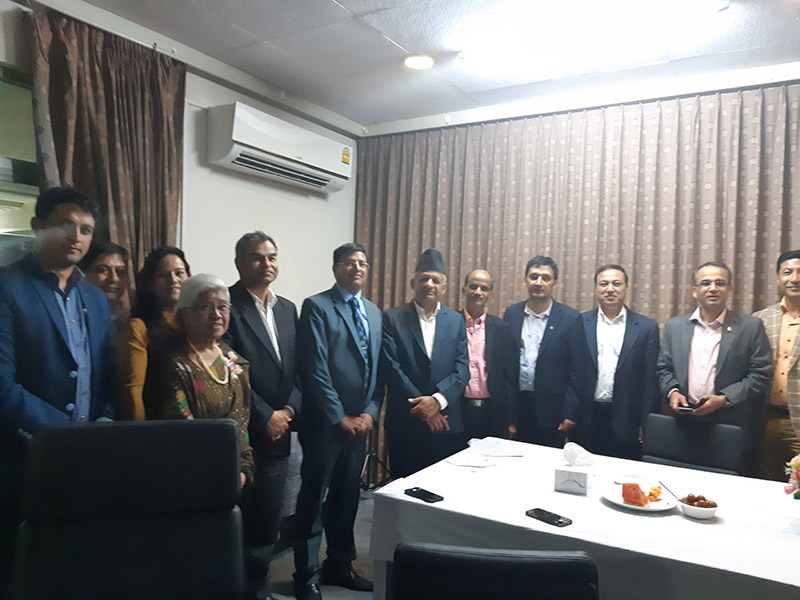Formal collaboration begins between Govt and NRNA think-tanks
KATHMANDU: Formal collaboration between Government of Nepal and Non-Resident Nepali Association (NRNA) for the public policy domain has started to materialise.
NRNA has made an official request to the Ministry of Foreign Affairs (MoFA) to begin the collaboration between newly instituted NRNA think-tank, Nepal Policy Institute (NPI) and government think-tanks.
The NPI team, led by its chair Khagendra Raj Dhakal, handed over NRNA’s official request letter to Minister for Foreign Affairs Pradeep Kumar Gyawali amidst an interaction programme held at the Embassy of Nepal in Bangkok on Thursday.
Speaking at the interaction programme, Foreign Minister Gyawali assured that he would wholeheartedly accept NRNA as a development partner of Government of Nepal and that the government would engage NPI towards materialising this special focus on policy formulation and reform process.
The NRNA’s letter, signed by President Bhaban Bhatta, reads that as a commitment of NRNA to contribute to the ongoing policy discourse of Nepal government, NPI needed to be in constant collaboration with different government agencies for which a focal point at National Planning Commission (NPC) has been requested.
It further says NPI is instituted based on Article 20.6 of the current NRNA constitution. Last October, NPI had presented its strategic plan for discussion at the plenary session of 1st Global NRN Knowledge Conference held in Kathmandu where Foreign Minister, NPC Vice Chair and independent think tanks had presented their views on the role of diaspora on development policies.
Incorporating the suggestions of all sides, NPI delegation including executive members Rajendra Prasad Shrestha (current AIT SERD Dean), Ramesh Singh (former Action Aid CEO), and Bishwa Tiwari (UNDP Affiliated Economist) had handed over NPI’s new draft of strategic plan (2019-2021) to the foreign minister and shared their views on social and economic development of Nepal. NPI strategic plan will be open for further feedback and comments from the wider spectrum, they informed.
Speaking at the same programme, NPI Chair Dhakal called upon the all Nepali and Nepali origin scholars, in Nepal and any part of the world, to be part of the NPI which will be an international think tank and knowledge platform for Nepali people.
Likewise, Dhakal elaborated that knowledge capital is something NRNA can bring to Nepal in more visible ways than financial capital for which NPI will develop thematic research teams clustering diaspora scholars with residential scholars. With the formalities of starting the collaboration, NPI has pointed that it has now entered from planning stage to partnership stage to prepare itself for the project stage.
Ambassador of Nepal to Thailand Khaga Nath Adhikari, NRNA Thailand President Assajita Awale, and Thai Nepali Society’s Patron David Khanal had given welcome speech at the programme, according to NPI secretariat.
The event was concluded with a dinner reception hosted by Embassy of Nepal after the interaction where Nepali professionals and community organisations' representatives were present.






